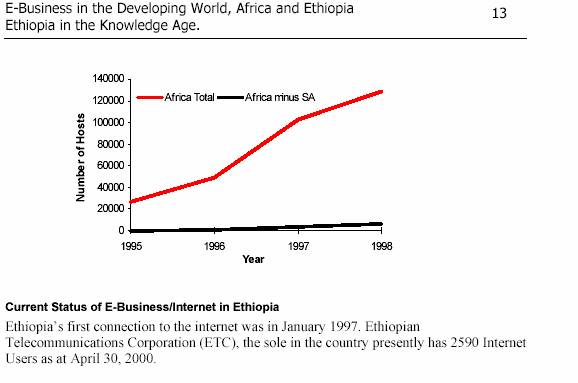
Network Economy
Ethiopia's Economy
Today Ethiopia is one of the most underdeveloped countries throughout the world.
And its economy is based largely on agriculture, responsible for more than half or
Ethiopia's Gross National Product (GNP). GNP was US$6670 million in 2001, with a
per capita income of US$100 per citizen. Nevertheless, poor cultivation and long
drought periods hampers the agriculture industry. The manufacturing industry is
dependent and inter-twined with the agriculture industry. The majority of the
manufacturing industry is run by the state, over 90%. However, in contrast, less
than 10% of agriculture is state run. The Ethiopian economy also suffers from
inadequate infrastructure throughout the country. Literacy levels among adults
are very low. Also, the economy is affected by civil in-fighting and fighting
with Eritrea.
ICT Employment Opportunities - Stage 1
Information Communication Technology (ICT) is essential in the economic
development and individual quality of life for many countries around the world.
When Ethiopia is compared with other countries within Africa regarding
e-readiness, the other countries are far better off than Ethiopia. Widespread
connectivity is very low and telecommunication networks are lacking in business
in Ethiopia. Therefore, because there is no demand for workers with technical
skills, ICT Employment Opportunities in Ethiopia are at stage 1.
There are plans to elevate ICT employment opportunities to a higher stage by connecting all villages by 2010, public libraries by 2006, hospitals by 2005 and health centers by 2010. If these goals are realized, it would create employment opportunities and leap frog Ethiopia into at least stage 3.
B2C Electronic Commerce
Ethiopia has an emerging Internet entrepreneurship despite a poor e-commerce
infrastructure.

![]()
![]()
New B2C markets are constantly opening and maturing in Ethiopia. It is doubtful that B2C portals will develop a vast international presence because of the capital required and the issues of delivery and faster service. Ethiopia has been late with connectivity and access but e-commerce is alive and well. Therefore, B2C Electronic Commerce in Ethiopia is at stage 2. Ethiopians are able to operate online businesses that are profitable. They leverage their international reputation for art and their strong tradition of gift giving during holidays.
B2B Electronic Commerce
Ethiopia is progressing in creating B2B business within the country,
however, lacking when it comes to International B2B. Domestic transactions are
common and resemble the traditional way business is done. International orders
are riskier and involve more parties. The supply chain is more complex and
involves government, customs, procurement, inventory and electronic document
processing.

We would place Ethiopia in stage 3 of B2B Electronic Commerce. B2B has increased and costs have lowered as the technology has matured. However the local initiative is low and a lot of the sites are set up due to people living in other countries who seek to buy products from Ethiopia.
E-Government - Stage 2
Ethiopia, when compared to other African countries when it
comes to Government usage of web pages and E-Leadership was ranked at a medium
level. It could be at a higher level if government supported and developed a
strategy to develop a best in class enterprise. This is a missed opportunity for
E-Government for Ethiopia. Also, some government restrictions on imports and
exports with permits and license place barriers preventing E-Government growth.
The fact that a lot of business and even the telephone networks are state owned
result in high communication cost, which is costly and uncompetitive. Despite
great strides by Ethiopia to reduce these barriers, we would place Ethiopia in
stage 2 of E-Government. They have not taken advantages of government agencies
posting key information on websites. There is no incentive to communicate with
suppliers or contractors because the majority of business is state owned.